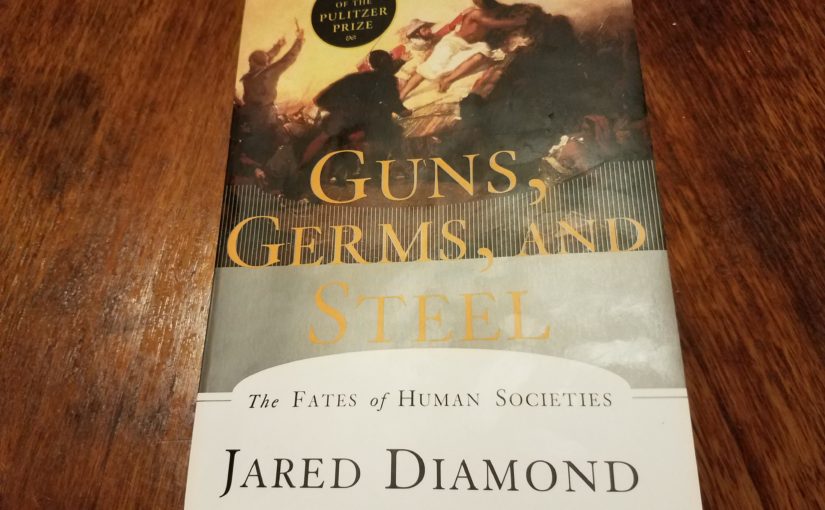Guns, Germs, and Steel by Jared Diamond is a classic that’s been sitting on my shelf for a couple years. I’m happy I finally moved it up to the front burner and dove in.
The book is relatively entry-level anthropology, and I found it highly enlightening, with interesting perspectives and ways to think about societal development.
I think it digs a level deeper than the book Sapiens by Yuval Noah Harari (also highly recommended!), but still captivating and easy to keep moving.
And it was a nice follow-up read focused on humans after devouring the more earth-focused A Short History of Nearly Everything by Bill Bryson.
Here are a few of my favorite excerpts, along with some comments, on Guns, Germs, and Steel — a classic well worth reading cover to cover.
“The most dramatic moment in subsequent European-Native American relations was the first encounter between the Inca emperor Atahuallpa and the Spanish conquistador Francisco Pizarro at the Peruvian highland town of Cajamarca on November 16, 1532…Pizarro proceeded to hold his prisoner for eight months, while extracting history’s largest ransom in return for a promise to free him. After the ransom — enough gold to fill a room 22 feet long by 17 feet wide to a height of over 8 feet — was delivered, Pizarro reneged on his promise and executed Atahuallpa.” p. 65-66
AF: I’m reminded of the one-sided perspective that can bias many historical accounts. For example, we usually only have the stories of what happened as told by the side that won.
“Food production evolved as a by-product of decisions made without awareness of their consequences. Hence the question that we have to ask is why food production did evolve, why it evolved in some places but not others, why at different times in different places, and why not instead at some earlier or later date…The underlying reason why this transition was piecemeal is that food production systems evolved as a result of the accumulation of many separate decisions about allocating time and effort.” Excerpts from p. 101-102, emphasis mine
“Woe betide the plant whose genetic program is mismatched to the latitude of the field in which it is planted!” p. 177
AF: Now, think about people as plants. What “regions” have “climates” that encourage our spread, that we’re already adapted to, that have the environment needed for long-term advancement and growth?
“The Iliad and Odyssey were composed and transmitted by nonliterate bards for nonliterate listeners, and not committed to writing until the development of the Greek alphabet hundreds of years later.” p. 225
“Without human inventiveness, all of us today would still be cutting our meat with stone tools and eating it raw like our ancestors of a million years ago. All human societies contain inventive people. It’s just that some environments provide more starting materials, and more favorable conditions for utilizing inventions, than do other environments.” p.392
AF: I see free will as our ability to set context. Maybe connected to our survival instincts of mobility to optimal environments. Thus, we should listen to our hunter-gatherer instincts to mobilize to environments with the most favorable conditions. We have a unique ability to do this relatively easily in present day society compared to historical human societies.
